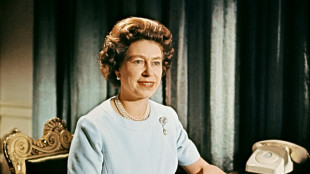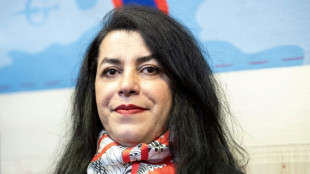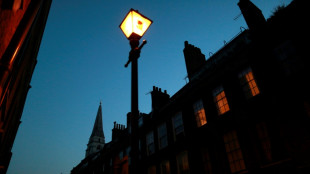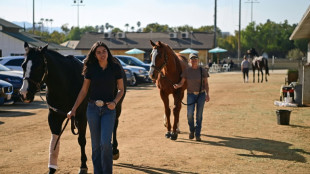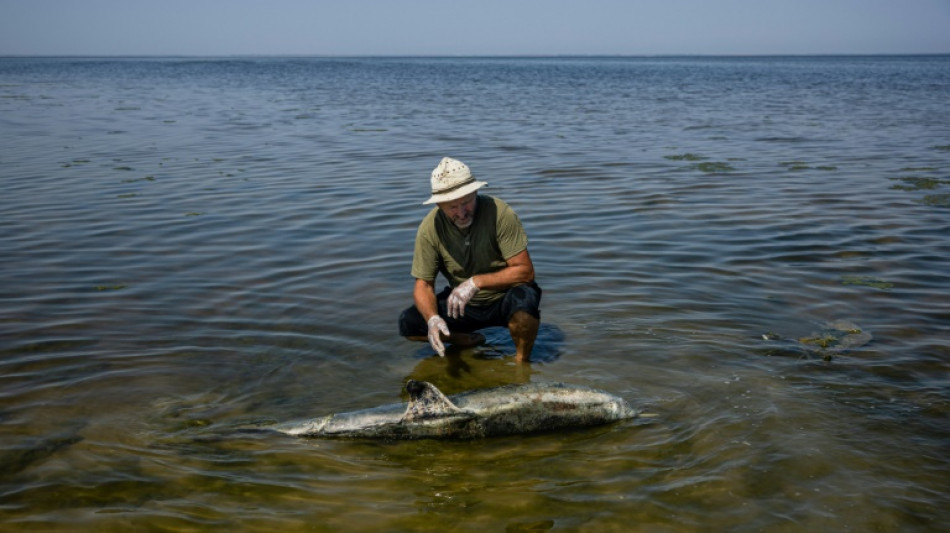
-
 Trump's policies won't push up inflation, economic advisor says
Trump's policies won't push up inflation, economic advisor says
-
German far-right AfD takes aim at Bauhaus movement

-
 Djokovic makes slice of history as Zheng stunned in Melbourne
Djokovic makes slice of history as Zheng stunned in Melbourne
-
The journalists behind Sarkozy's Libya corruption woes

-
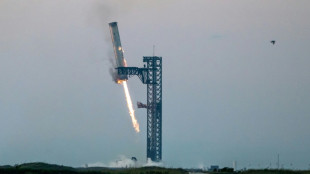 SpaceX set for seventh test of Starship megarocket
SpaceX set for seventh test of Starship megarocket
-
Record-setting Djokovic trumps Federer on way to Melbourne third round

-
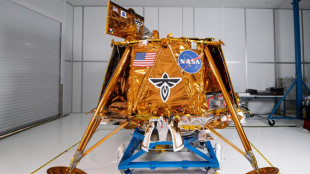 Private US, Japanese lunar landers launch on single rocket
Private US, Japanese lunar landers launch on single rocket
-
Spanish youth ditch dating apps for 'real life' love

-
 Pakistan plot spin blitz as West Indies return after 19 years
Pakistan plot spin blitz as West Indies return after 19 years
-
Alcaraz tips 'incredible' Fonseca to be among world's best 'soon'

-
 Stunned Zheng blames lack of warm-up for early Melbourne exit
Stunned Zheng blames lack of warm-up for early Melbourne exit
-
Ominous Alcaraz 'really, really happy' with Australian Open form

-
 Pakistan's Imran Khan defiant even as longer sentence looms
Pakistan's Imran Khan defiant even as longer sentence looms
-
Bangladesh's Yunus demands return of stolen billions

-
 Relieved Sabalenka defies serve struggles to stay alive in Melbourne
Relieved Sabalenka defies serve struggles to stay alive in Melbourne
-
Zheng out in Melbourne shock as Sabalenka, Osaka battle through

-
 Osaka gets 'revenge' on Muchova in Australian Open fightback
Osaka gets 'revenge' on Muchova in Australian Open fightback
-
Mitchell leads Cavs over Pacers, Thunder beat 76ers

-
 S. Korea's Yoon: from rising star to historic arrest
S. Korea's Yoon: from rising star to historic arrest
-
Ominous Alcaraz sweeps into Australian Open third round

-
 'Queen Wen' deposed in huge shock at Australian Open
'Queen Wen' deposed in huge shock at Australian Open
-
Vigilante fire clean-up launched by local Los Angeles contractor

-
 Zheng dumped out in huge shock as shaky Sabalenka battles through
Zheng dumped out in huge shock as shaky Sabalenka battles through
-
Asian equities mixed as US inflation, China data loom

-
 'Queen Wen' Zheng deposed in huge shock at Australian Open
'Queen Wen' Zheng deposed in huge shock at Australian Open
-
Renewed US trade war threatens China's 'lifeline'

-
 China's economy seen slowing further in 2024: AFP survey
China's economy seen slowing further in 2024: AFP survey
-
Shaky Sabalenka overcomes serve struggles to stay alive in Melbourne

-
 South Korea's six weeks of political chaos
South Korea's six weeks of political chaos
-
Japan's tourism boom prices out business travellers

-
 What is the pink stuff coating fire-ravaged Los Angeles?
What is the pink stuff coating fire-ravaged Los Angeles?
-
Mediators make final push for Gaza truce deal

-
 Musk, Bezos, Zuckerberg to attend Trump inauguration: report
Musk, Bezos, Zuckerberg to attend Trump inauguration: report
-
Federal probe begins into deadly Los Angeles fires

-
 'We may look easy-going, but...' Canadians veto Trump's merger plan
'We may look easy-going, but...' Canadians veto Trump's merger plan
-
Is obesity a disease? Sometimes but not always, experts decide
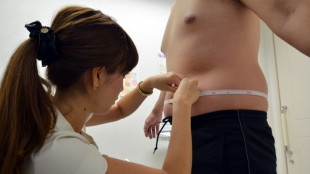
-
 Biden issues land protections after LA fires delay ceremony
Biden issues land protections after LA fires delay ceremony
-
Cuba to free over 550 prisoners after removal from US terror list

-
 Williams, Vine vie for season-opening Tour Down Under crown
Williams, Vine vie for season-opening Tour Down Under crown
-
Maresca 'concerned' as Chelsea winless run stretches to five games

-
 'Outstanding' Liverpool deserved more than Forest draw: Slot
'Outstanding' Liverpool deserved more than Forest draw: Slot
-
Guardiola laments Man City decision-making in Brentford collapse

-
 Marseille dumped out of French Cup on penalties
Marseille dumped out of French Cup on penalties
-
Liverpool frustrated by Forest, Man City blow late lead at Brentford

-
 Djokovic, Sabalenka chase history as Australian Open hits round two
Djokovic, Sabalenka chase history as Australian Open hits round two
-
Golf star Woods pledges support amid 'unimaginable loss' of LA fires

-
 Liverpool held by Forest, Man City blow late lead at Brentford
Liverpool held by Forest, Man City blow late lead at Brentford
-
Cuba to free 553 prisoners after removal from US terror list

-
 Leverkusen win to go one point behind Bayern, Kiel down Dortmund
Leverkusen win to go one point behind Bayern, Kiel down Dortmund
-
Jota rescues leaders Liverpool in Forest draw


Black Sea dolphins casualties of Russia's war in Ukraine
Pacing up and down a beach of fine white sand on the Black Sea coast, 63 year-old Ukrainian scientist Ivan Rusev breathes a sigh of relief: he did not find any dead dolphins today.
A few moments earlier he had rushed towards what he thought was a stranded dolphin. Mercifully it turned out only to be "tangled fishing gear".
Rusev spoke to AFP from the Tuzly Estuaries National Nature Park, a protected area of 280 square kilometres (108 square miles) in the Bessarabia region of south-west Ukraine.
Rusev, whose weather-beaten face is shaded by a hat he brought during adventures in central Asia, is the scientific director of the park.
Now his job entails walking every morning along beaches bordered by anti-tank mines in search of the dolphins that have been washing up here since the beginning of the war.
"We only found three dolphins over our entire 44 kilometres (27 miles) coastline last year," he tells AFP.
"This year, over the five kilometres (3 miles) that we can still access, we already found 35 of them."
Much of the coastline has been off-limits to employees of the park since Ukrainian troops took up positions there to prevent any possible Russian sea assault.
This means Rusev and his team cannot say exactly how many dolphins have been stranded in the park or survey the full extent of the damage.
- Dangerous sonars -
In any case, the death toll is "terrifying," says Rusev, who has been keeping an online diary -- now widely followed on Facebook -- about the impact of the war on wildlife.
When dolphins started washing up on the coast in March, Rusev and his team had to get to work quickly to spot dead animals before the many jackals roaming the area got to them.
"Then, we reached out to our colleagues in Turkey, Bulgaria, Romania. Everyone witnessed the same thing: a huge number of dolphins have died since the beginning of the war," Rusev said.
The Turkish Marine Research Foundation (TUDAV) warned in March of an "unusual increase" in dead dolphins washing ashore on the Black Sea coast.
Rusev estimates that 5,000 dolphins have been killed -- about 2 percent of the total dolphin population in the Black Sea.
The Black Sea was home to an estimated 2 million dolphins during the 20th century, but fishing and pollution contributed to their decline.
A survey found there were about 250,000 of dolphins left in 2020.
There's no doubt in Rusev's mind: military sonars used by Russian warships are to blame for the current bloodbath.
The powerful sonars used by warships and submarines "interfere with dolphin's hearing systems", he explains.
"This destroys their inner ear, they become blind and cannot navigate or hunt," and are more susceptible to lethal disease due to their weakened immune systems, according to Rusev.
The dolphin remains do not show any trace of fishing nets or wounds, which for Rusev is further evidence ruling out the possibility they died any other way.
- Trading blame -
Russia and Ukraine are trading blame even on the environmental toll of the war, so Rusev's theory is disputed.
Russian scientists who looked into the increase in dolphin mortality blamed morbillivirus, a common lethal disease for the species.
Rusev and his team took samples from dolphins that had recently been found and have sent them to Germany and Italy to settle the debate.
Usually Rusev sleeps in a cabin next to the entrance of the park.
Today, the carcass of a dead dolphin lies next to his cabin, in the lagoon's stagnant waters.
Rusev covered it with a fishing net. That way, he explains, fish will eat the flesh, and he can give the remaining skeleton to a museum.
The scientist, sometimes halting conversation to marvel at a white-tailed sea eagle or a flock of pelicans, is visibly worried.
Military strikes have already hit the national park and burned 100 hectares of protected land.
"War is a terrifying thing," he said. "It impacts the whole ecosystem, including species that won't easily recover.
"Nature's balance won't easily recover either."
J.Horn--BTB

